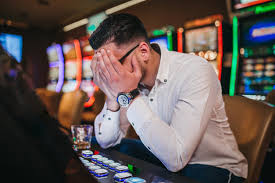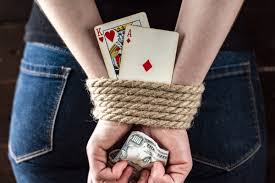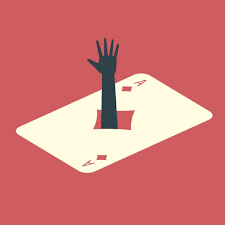You’re sitting in front of your laptop at home, playing your favorite slot games online. You feel the ‘gambler’s rush’ as you wait in anticipation. Win or lose, you are excited to be gambling. But how do you know if you are addicted to gambling, or if you have a gambling problem? The following tell-tale signs of gambling addiction will let you know if you need to seek help, and where to get it.
Recognizing Gambling Addiction
Gambling addiction is real. It makes no difference if you’re into land-based casinos or online gambling. There are multiple new studies which prove that certain types of people are more susceptible to addiction than others. Furthermore, the signs of gambling addiction are very similar to drug addiction. According to Scientific American, studies show that addictive drugs and gambling addiction rewire the neural circuits of the human brain in similar ways.
Rather than focusing on addiction as being unique to a substance or a chemical, the American Psychiatric Association (APA) looks at the psychological implications of pathological gambling. In an update to the Diagnostic and Statistical Manual of Mental Disorders (DSM), the APA officially classified gambling addiction as an impulse-control disorder. A more recent update from the DSM-5 re-classifies the condition as an addictive disorder, with similarities to alcoholism or substance dependency.
Behavioral disorders are measured by how an individual processes emotions, trauma, and other risk indicators. Addictive disorder studies show that the brain releases dopamine while a person gambles. This is much the same way that drugs stimulate dopamine production in the brain. That ‘gambler’s high’ that people feel when they are gambling is more about the risk than the reward. This is the main reason that gambling addicts keep going back for more, even when they’re nearly broke.
Top Signs of Gambling Addiction
Online gambling should not have a stigma any more than any other product with potential risk. People smoke and drink in spite of all of the risks. They ignore warning labels, studies, and personal stories from people who have lost loved ones to lung cancer or liver disease. The important thing to understand is that gambling, like chemically-addictive products, is not the problem. It’s how the products are used—or abused—that leads to addiction. So the key is moderation. And if you are not gambling in moderation and you’re concerned that you may have a gambling problem, there is a list of symptoms to watch out for.

Researchers suggest that more than 80% of gambling addicts never seek treatment. This is down to a lack of education on the real dangers of gambling addiction and the devastation it can cause. The damage affects the lives of the gambler and their loved ones. The studies linking gambling addiction to other forms of addictive behavior (like drug abuse) are fairly new. So, it takes time to get the facts out, and to get health care professionals and casinos to participate in helping to spot problem gamblers.
If you or someone you care about has experienced four or more of the symptoms below within a 12-month period, it could be a sign of gambling addiction. View them as a warning to seek help. Not everyone will experience the same symptoms, but they are all warning signs which should not be ignored.
Raising the Stakes for the Same High
Understanding how dopamine gives you that ‘high’ feeling allows us to explain how it wears off and needs reinforcement. If you are a drinker, you probably remember your first drink and the rush you felt. Remember how it quickly went to your head? . Several years later, it took more drinks to get the same feeling. This tolerance is developed in the brain as a response to the floods of dopamine rushing through it. The brain reduces the amount of dopamine released in order to protect its neural pathways.
So if you find yourself gambling with increasing amounts of money to get the same ‘gambler’s rush’. This is a sign that you have gambled so much that you have developed a tolerance to the ‘high.’ Increasing your betting size is a sign of overcompensation for the diminishing high. Instead of betting with ten bucks at a time, it eventually becomes hundreds, or even thousands. Also, if you see your car keys, wedding ring, or the deed to your house in the pot—that’s a real problem.
Quitting Gambling Results in Irritability
If after you have said ‘enough is enough’ to gambling, and you find yourself restless or irritable all of the time, this could be a sign of gambling addiction. A drug addict experiences withdrawal when he doesn’t get his fix. The psychological impact of quitting gambling is very similar.
The psychological reactions of restlessness and irritability are caused by the lack of dopamine which normally rushes through your brain. Once we understand that gambling addiction has very real chemical indicators, scientific researchers can predict the resulting ‘withdrawal’ feelings with a fair degree of accuracy.
Repeated Attempts to Stop Gambling Have Failed
Nothing signals addiction more than the inability to quit. The first step in solving a problem is knowing that the problem exists. But it often takes a huge effort to quit gambling if you are addicted. This is especially true if you have tried to stop gambling over and over in a period of 12 months, but failed. Also, repeated failure to quit is a sign that you need help.
Preoccupied with Gambling

It’s normal to look forward to the weekend or a vacation. It’s also ok to look forward to playing slot games online. However, if all you think about is online gambling and all those shiny slot machines with bonus games, this is another signal that gambling is more than just a passing fancy.
Other signs of gambling addiction is if you relive past gambling experiences. For example, thinking about your biggest single win or last winning blackjack hand. Also, if you are always thinking of ways to get more gambling money, this is the sign of an unhealthy preoccupation with gambling.
Gambling When Feeling Distressed or Depressed
It’s also normal to have occasional feelings of stress or anxiety. Even the occasional feeling of guilt or depression is part of being human. But if these feelings are so regular that you need to overcome them by gambling, this can lead to a gambling problem. Many forms of addiction are a reaction to negative emotions. We do not want to dwell on negative feelings, so we seek an escape. However, using gambling as a crutch whenever we feel bad is not healthy behavior. In this case, seeking treatment for the root causes of your negative feelings may also help stop compulsive gambling.
Chasing Losses
Another sign of a potential gambling problem is having the feeling of certainty that you can recover your lost wagers by betting more and more. The idea is that a losing streak is temporary, and all you need to win is to continue betting. This is poor logic at best. If you keep throwing good money after bad, and don’t know when to quit, this is a big red signpost on the road to ruin.
Lying about Gambling
People may tell ‘little white lies’ from time to time to protect the feelings of others. But if you find yourself lying about gambling on a regular basis, this signifies 2 things. Firstly, you feel bad about gambling so much that you feel you need to hide it from those you care about. Secondly, your fear of being caught doing something shameful leads to dishonesty, rather than addressing the problem.
Losing More than Money
If you have ever lost a job, career opportunity, or a relationship due to gambling, this is serious. Addiction does not only harm you, it harms others in your life. If you were caught ‘borrowing’ money from a company account to gamble—and got fired—this was not a misunderstanding. It was a serious criminal act used to justify an addiction. The same goes with relationships. Your loved ones will not put up with lies and manipulation to serve a gambling addiction.
Borrowing to Cover Gambling Losses
If you find yourself constantly borrowing money from others to alleviate desperate financial conditions brought about by gambling, this is a wakeup call. We all have unexpected financial emergencies from time to time. It’s good to know that our friends have our back when we need them. But there is a big difference between an unexpected auto repair bill and regularly losing your rent money at the craps tables.
Getting Help for Gambling Addiction

If you or someone you care about has 4 or more of the symptoms listed above, it’s time to get help. The sooner, the better. Like any addiction, treatment is effective when the problem is acknowledged. It’s better to act now than to lose everything to a gambling addiction. Help is available, but casinos can also do more to help with problem gambling. A brick-and-mortar casino can place gambling addiction brochures near ATM machines and the cashier’s desk. The best online casinos have links to Gambler’s Anonymous and other organizations on their web pages.
When the chips are down, it’s in everyone’s interest to spread information on gambling addiction, its causes, and cures. The gambling addict can recover before they lose everything, but only if they receive help in time. Also, casinos may profit from sudden windfalls of cash from gambling addicts. However, no casino wants to have gamblers indebted to them for amounts which cannot be repaid. It’s bad for everyone involved.







